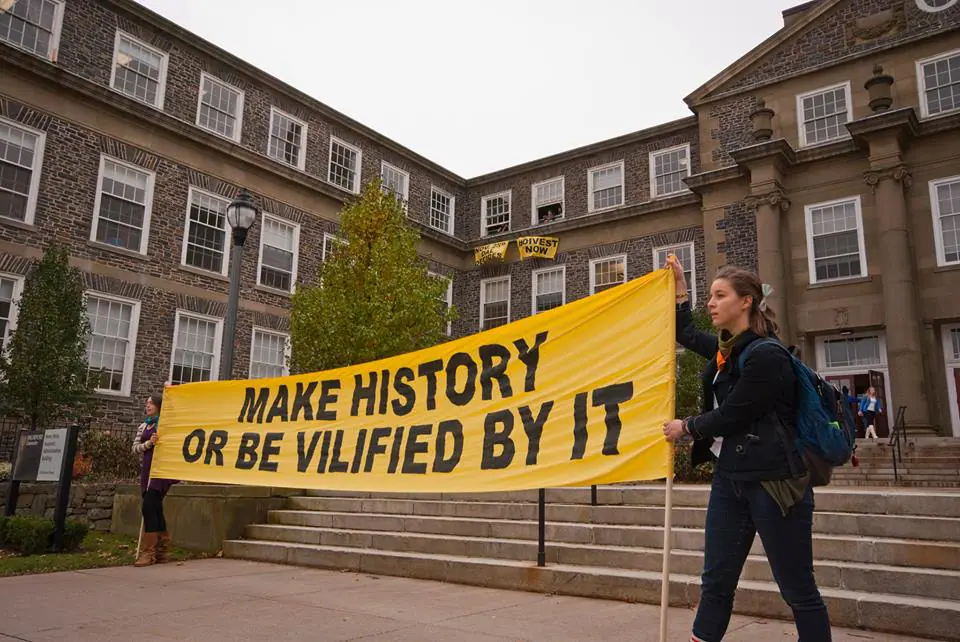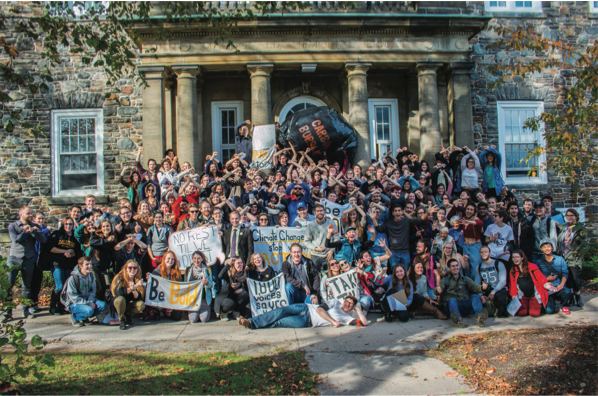Board of Governors to release recommendations for divestment action, or inaction
This afternoon, Dalhousie students will hear whether their university will be the first in Canada to commit to divesting its endowment fund of investments in fossil fuels.
Since last year, student action encouraging Dalhousie to take a bolder stance against climate change has led to Dalhousie’s Board of Governors (BOG), the university’s highest governing body, conducting research on the topic of fossil fuel divestiture. At today’s BOG meeting, the board’s Investment Committee will present a report on their recommendations to how divestment should be handled.
Divestment was first discussed by the board after activist group Divest Dalhousie began appearing at BOG meetings in Nov. 2013.
The students behind Divest Dal have made various requests of university administration. They want Dalhousie to freeze new investments in fossil fuel companies and divest from direct ownership in investment assets that include fossil fuels, within four years.
Divest Dal provided the BOG’s Investment Committee with a list of 200 companies with the largest carbon reserves, the annually-updated Carbon Underground 200.
The committee determined in October that Dalhousie’s Endowment portfolio held investments in a total of 35 companies on the list, at a total value of $20.3 million – 4.3 per cent of their total portfolio.
The Investment Committee acknowledged last month that as of Oct. 15, “no Canadian university has undertaken divestment of its university endowment holdings in fossil fuel companies.” If the committee recommends it, Dalhousie would be the first university in Canada to pursue divestment.
For students in support of divestment, this decision has been a long time coming – the advocacy and research done to bring this issue to the forefront of discussion on campus has been occurring for over two years.
Background
Divest Dal is a project of the Halifax Environmental Justice Collective (HEJC), which in turn is a working group of the Nova Scotia Public Research Group (NSPIRG). NSPIRG is a levied student society of the Dalhousie Student Union (DSU) and an organization dedicated to research in environmental and social issues.
In 2012, a report was prepared on behalf of NSPIRG, Too Close for Comfort? Exploring the Cozy Relationship Between the Fossil Fuel Industry & Dalhousie University.
An investigation into how Dalhousie accepts donations from energy companies, has members of its Board of Governors who have ties to the fossil fuel industry and has investments in the fossil fuel industry; the report listed “Start a Fossil Fuel divestment campaign” as one of its recommendations.
“Our university’s money should not be supporting the social and environmental destruction caused by the fossil fuel industry,” says the report.
The fall semester of the 2013-14 academic year started with the HEJC announcing their Divest Dalhousie campaign.
At the time, university president Richard Florizone was in his third month at Dalhousie. His 100 Days of Listening campaign, where he aimed to gather input from as many voices at Dalhousie as possible in his first 100 days on the job, was still ongoing.
Florizone discussed divestiture with members of the HEJC, and later wrote on his Tumblr page about the meeting, “It was another example of what’s great about Dal students: they are talented, engaged, and passionate about making a difference in the world.”
Since November 2013, Divest Dal has brought record-breaking numbers of students out to BOG meetings. In February 2014, members of the group met with the BOG’s Investment Committee for the first time.
George McLellan, chair of the committee, said at the April 2014 BOG meeting that Divest Dal had given an excellent presentation in February. Updates on the committee’s divestment research have been presented at every BOG meeting since June 2014.
In August 2014, Divest Dal announced their 100 Days of Action campaign. The campaign, with a tongue-in-cheek name referencing president Florizone’s 100 Days of Listening, was designed to raise awareness of divestment and the action occurring on Dal campus.
The BOG’s Investment Committee released an interim report in October detailing the results of their research so far. The report outlines similar action towards divestment occurring at other universities in Canada and the USA and what options Dal has. It concludes that their final recommendations will be revealed in a report to be delivered at the Nov. 25 meeting.
Endorsements on campus and from afar
Among the groups at Dal that have formally endorsed Divest Dal are the DSU, the executives of the Dalhousie Faculty Association, the Dalhousie Arts and Social Sciences Society and the King’s Student Union. The group has received over 2,000 petition signatures.
In solidarity with Divest Dal, the DSU is taking action to divest their own investment portfolio of fossil fuels. While DSU council originally hoped to divest before the Nov. 25 Board of Governors meeting in order to pressure the board, the union’s motion to divest is now scheduled for their Dec. 3 council meeting.
While Dalhousie could be the first university in Canada to commit to divestment, many groups at post-secondary institutions across Canada are taking on a similar mission to Divest Dal.
Other climate justice groups at universities across Canada that have vocally endorsed Divest Dal in the last week include Divest Saint Mary’s, Divest Mount Allison, U of Toronto 350, Divest Simon Fraser University, Divest McGill, Divest University of Victoria, Queen’s Backing Action on Climate Change and Divest MUN.
Many of these groups have said their respective institutions will be watching Dalhousie’s decision today.
Environmentalist David Suzuki; leader of the Green Party of Canada, Elizabeth May and ethicist Peter Singer have also endorsed Divest Dal.
University of Toronto Students in Solidarity with Dalhousie for Fossil Fuel Divestment: Nov 24, 2014
Criticisms
Divest Dal has not been without criticism. In the preceding months, some members of the Dalhousie community have expressed concerns with the campaign.
At yesterday’s meeting of Dalhousie senate, discussion of divestment consumed the final 45 minutes of the meeting. According to a report by UNews.ca some university senators believe that certain students, like those studying petroleum engineering, could have worsened employment prospects if Dal divests.
The DSU hosted a town hall on divestment last night. Some audience members expressed support for the campaign while others found it questionable. Two members of Divest Dal, Simon Greenland-Smith and Mike Dungey, were present and fielded audience questions.
Moving forward
Members of Divest Dal have repeatedly expressed a commitment to keeping the campaign moving if the BOG doesn’t budge on its biggest carbon holdings. Evelien Vanderkloet, an organizer of the group, told the Gazette in September that if the BOG says “no”, the campaign will only continue to grow and get louder.
The issue of rearranging a $403 million endowment is incredibly complex. The BOG’s Investment Committee’s interim report acknowledges this – “As outlined throughout this report, discussion on climate change and how to reduce our dependence on, and use of, fossil fuels is now and will continue to be part of a global conversation for some time,” says the report.
“Like these issues, divestment is complex and warrants the same thoughtful consideration, with a measured, balanced and thoughtful review on a number of fronts (financially and non-financial) to determine meaningful and useful approaches for Dalhousie.”
At yesterday’s DSU town hall, Divest Dal organizer Simon Greenland-Smith said it will be up to the university’s financial managers where to reinvest the funds, but that Divest Dal “has some ideas” where they’d like to see it go and the Dal community should have a say.
The Board of Governors will meet at 3 p.m. at University Hall in the MacDonald Building.
The meeting is open to the public, and Divest Dal will be present on the quad of Studley Campus at 2:30 p.m. A poster released by the DSU says there will be cake.
We will be livetweeting the proceedings of the BOG meeting. Follow us at @Dalgazette for live results.




Recent Comments